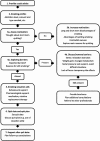Understanding Dutch practice nurses' adherence to evidence-based smoking cessation guidelines and their needs for web-based adherence support: results from semistructured interviews
- PMID: 28336746
- PMCID: PMC5372119
- DOI: 10.1136/bmjopen-2016-014154
Understanding Dutch practice nurses' adherence to evidence-based smoking cessation guidelines and their needs for web-based adherence support: results from semistructured interviews
Abstract
Objectives: Practice nurses in general practices suboptimally adhere to smoking cessation guidelines. Since the effectiveness of their smoking cessation support is greatest when full adherence to these guidelines is achieved, interventions need to be developed to improve practice nurses' guideline adherence, for example, by tailoring their content to adherence determinants. However, the sociocognitive determinants explaining adherence have not yet been investigated. Therefore, this qualitative needs assessment aimed to explore practice nurses' current counselling practices, as well as their sociocognitive beliefs related to their smoking cessation guideline adherence and their needs regarding web-based adherence support.
Setting: Primary care; general practices in the Netherlands.
Participants: 19 practice nurses, actively involved in smoking cessation counselling.
Methods: Semistructured individual interviews, based on the I-Change Model and the Diffusion of Innovations Theory, were conducted from May to September 2014. Data were systematically analysed using the Framework Method and considered reliable (κ 0.77; % agreement 99%).
Results: Respondents felt able to be empathic and collaborative during smoking cessation consultations. They also reported psychological (eg, low self-efficacy to increase patient motivation and arranging adequate follow-up consultations) and practical barriers (eg, outdated information on quit support compensation and a perceived lack of high-quality trainings for practice nurses) to smoking cessation guideline adherence. Most respondents were interested in web-based adherence support to overcome these barriers.
Conclusions: Sociocognitive determinants influence practice nurses' smoking cessation guideline adherence. To improve their adherence, web-based tailored adherence support can provide practice nurses with personally relevant feedback tailored to individually perceived barriers to smoking cessation guideline adherence. More specifically, low self-efficacy levels can be increased by peer modelling (eg, presenting narratives of colleagues) and up-to-date information can be presented online, enabling practice nurses to use it during patient consultations, resulting in more effective communication with their smoking patients.
Trial registration number: NTR4436; Pre-results.
Keywords: PREVENTIVE MEDICINE; PRIMARY CARE; QUALITATIVE RESEARCH; smoking cessation; tailored support.
Published by the BMJ Publishing Group Limited. For permission to use (where not already granted under a licence) please go to http://www.bmj.com/company/products-services/rights-and-licensing/.
Conflict of interest statement
Figures
References
-
- WHO. WHO report on the global tobacco epidemic 2013: enforcing bans on tobacco advertising, promotion and sponsorship. Geneva: World Health Organization, 2013.
-
- USDHHS. The health consequences of smoking—50 years of progress. A report of the surgeon general. Atlanta, GA: USA: Department of Health and Human Services, Centers for Disease Control and Prevention, National Center for Chronic Disease Prevention and Health Promotion, Office on Smoking and Health, 2014.
-
- RIVM. Volksgezondheid Toekomst Verkenning (VTV) ‘Een gezonder Nederland’. Bilthoven: 2014.
-
- Nederlands Huisartsen Genootschap & Landelijke Huisarsten Vereniging. NHG/LHV Standpunt: Het (ondersteunend) Team in de huisartsenvoorziening. Utrecht: Nederlands Huisartsen Genootschap and Landelijke Huisartsen Vereniging, 2011.
Publication types
MeSH terms
Associated data
LinkOut - more resources
Full Text Sources
Other Literature Sources
Medical

